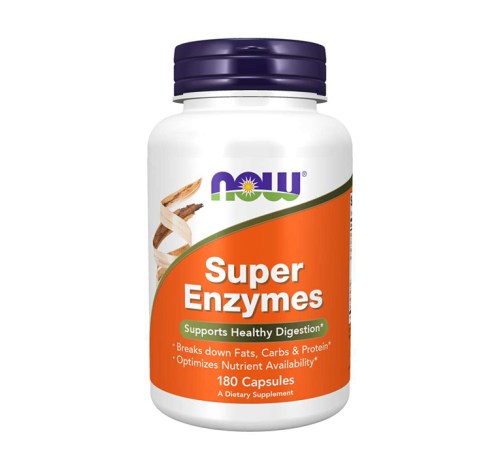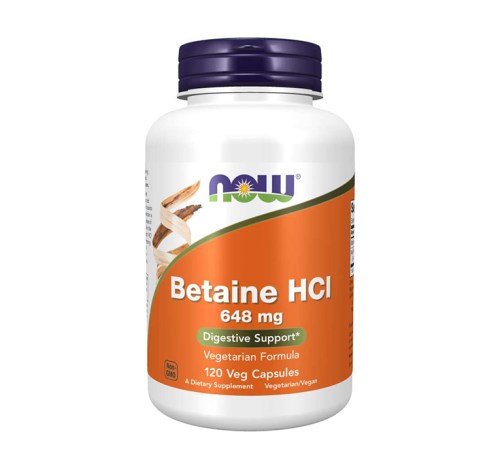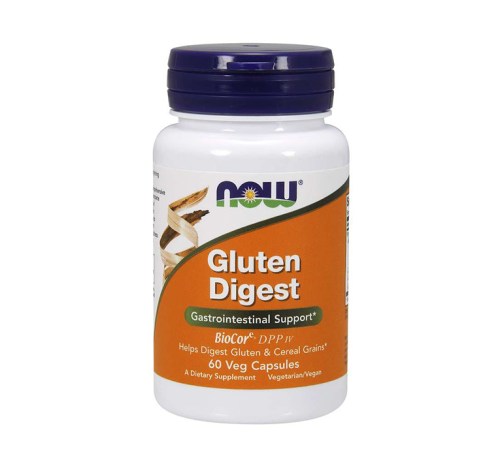If you’ve turned down your go-to salad or scoop of ice cream because you know a giant bloat with a side of stomachache will be right around the corner, we’ve got some intel your taste buds will want in on.
Specifically, some intel on digestive enzymes. According to DJ Blatner, RDN and NOW® expert, “healthy digestion is when the foods you eat are properly broken down so the nutrients can go into your bloodstream and fuel all of your body cells.” Digestive enzymes are what help break down your food into smaller, more absorbable pieces, she says. “Our body makes enzymes for digestion, but enzyme production declines as we age and the enzymes our body produces become less efficient.”
Woah, woah, woah. First, adulthood means bills and more responsibility… and then you’re thrown a digestive curveball too? Correct—and that curveball means that if your stomach isn’t breaking down your food enough, you could feel bloated, have cramps, and may not even be absorbing all the nutrients you could be, Blatner says. But don’t panic—because supplements can help.
Keep scrolling for a closer look at how digestive enzymes can help you get back to eating your favorite foods again.
1. Let’s break down the enzymes
There are three micronutrients: carbs, protein, and fat—and there are different digestive enzymes to help break down each one, Blatner says. Amylase to help break down carbs, Proteases for protein, and Lipases for fat.
And then it gets even more granular. Outside of the big three, there are more enzymes that target specific parts of food, specifically ones that are common culprits for irritation. Enter cellulase, which helps break down plant fiber in fruits, veggies, beans, and nuts. Next up is lactase, which breaks down lactose. “Alpha-galactosidase helps break down complex sugars in beans and other plant-based foods,” says Blatner of another focused enzyme.
If you’ve you’ve taken a recent poll of your friend group of which foods trigger their gas-and-bloat issues, they likely fall into the buckets above. Think: Nixing real milk from your coffee, keeping the veggie-packed salads to a minimum at work, or wearing leggings if you know gluten is going to be involved. Cue the need for digestive enzymes in supplement form*.

NOW® Super Enzymes Capsules — $37.00
2. What to do about it
Luckily, adding these digestive enzymes back into your body can help mitigate the discomfort*. Just like you’d take a supplement when you become deficient on a vitamin or mineral, you can do the same with your digestive enzymes.
NOW® Super Enzymes addresses all macronutrients (remember: carbs, protein, and fat*) and optimizes nutrient availability*—because when food is better broken down, your body is better able to absorb the nutrients it provides*, Blatner says. “Food that is not properly broken down passes into the large intestine for bacteria to break down, which creates gas,” she adds. “Better broken down, digested food means less gas and bloating.*” (The dream.)
And if you do deal with a sensitivity to your favorite pastas and grains (aka delicious gluten-filled foods), NOW® Gluten Digest Veg Capsules have an enzyme blend created to promote the digestion of cereal grains, so you can have your pasta (or toast or oats), and eat it, too*. Simply take one before a meal that tends to make you feel bloated or gassy, and continue to munch on your fave eats without the discomfort*.
Oh, one last pro tip: “In addition to digestive enzymes to help break down food, focus on fully chewing each bite of food,*” she says. “Digestion begins in your mouth—chewing well helps the whole digestive process work better.” Welcome back, favorite foods.

NOW® Betaine HCl 648 mg Veg Capsules — $20.00

NOW® Gluten Digest Veg Capsules — $20.00
*These statements have not been evaluated by the Food and Drug Administration. These products are not intended to diagnose, treat, cure or prevent any disease.
Sign up for the Well+Good SHOP Newsletter
Get exclusive deals on wellness, beauty, fitness, and food products that have been hand-picked by our editors.
Got it, you've been added to our email list.





